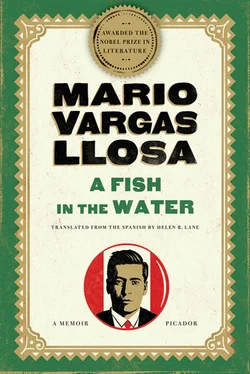Mario Vargas Llosa - A Fish in the Water - A Memoir
Здесь есть возможность читать онлайн «Mario Vargas Llosa - A Fish in the Water - A Memoir» весь текст электронной книги совершенно бесплатно (целиком полную версию без сокращений). В некоторых случаях можно слушать аудио, скачать через торрент в формате fb2 и присутствует краткое содержание. Год выпуска: 2015, Издательство: Macmillan, Жанр: Биографии и Мемуары, на английском языке. Описание произведения, (предисловие) а так же отзывы посетителей доступны на портале библиотеки ЛибКат.
- Название:A Fish in the Water: A Memoir
- Автор:
- Издательство:Macmillan
- Жанр:
- Год:2015
- ISBN:нет данных
- Рейтинг книги:3 / 5. Голосов: 1
-
Избранное:Добавить в избранное
- Отзывы:
-
Ваша оценка:
- 60
- 1
- 2
- 3
- 4
- 5
A Fish in the Water: A Memoir: краткое содержание, описание и аннотация
Предлагаем к чтению аннотацию, описание, краткое содержание или предисловие (зависит от того, что написал сам автор книги «A Fish in the Water: A Memoir»). Если вы не нашли необходимую информацию о книге — напишите в комментариях, мы постараемся отыскать её.
is a twofold book: a memoir of one of Latin America's most celebrated witers, beginning with his birth in 1936 in Arequipa, Peru; and the story of his organization of the reform movement which culminated in his bid for the Peruvian presidency in 1990.
A Fish in the Water: A Memoir — читать онлайн бесплатно полную книгу (весь текст) целиком
Ниже представлен текст книги, разбитый по страницам. Система сохранения места последней прочитанной страницы, позволяет с удобством читать онлайн бесплатно книгу «A Fish in the Water: A Memoir», без необходимости каждый раз заново искать на чём Вы остановились. Поставьте закладку, и сможете в любой момент перейти на страницу, на которой закончили чтение.
Интервал:
Закладка:
Thereupon, in Peru and in many other places it began to be said that, even though defeated at the ballot box, I had vicariously won the election — one of those famous “moral triumphs” that conceal Peruvian failures — because President Fujimori had appropriated my ideas and put my program for governing into practice. His brand-new critics from within, the APRA and the parties of the left, said as much, as did the right, and the entrepreneurial sector in particular, which, relieved by the new president’s change of direction, finally felt free of the insecurity of the Alan García era. The result was that this thesis — this fiction — in the end became the incontrovertible truth.
This has been, I believe, my real defeat, not the superficial one of June 10, because it perverts a good part of what I did and everything I tried to do for Peru. That thesis was already untrue before April 5, and is much more so since the power play whereby Fujimori deposed senators and congressmen who had a legitimacy as unquestionable as his own, and restored, with a new mask — as in those Kabuki melodramas where, beneath the masks of many characters, there is always the same actor — the authoritarian tradition, the reason behind our backwardness and barbarism.
The program for which I had sought a mandate and which the Peruvian people refused to give me proposed placing public finances on a sound footing, putting an end to inflation, and opening the Peruvian economy to the world, as part of an integral plan to dismantle the discriminatory structure of society, removing its systems of privilege, so that the millions of impoverished and marginalized Peruvians could finally accede to what Hayek calls the inseparable trinity of civilization: legality, freedom, and property. *And to do so with the acquiescence and the participation of Peruvians, not under cover of darkness and treachery, that is to say, by fortifying, instead of undermining and prostituting, in the process of economic reforms, the newborn democratic culture of the country. That project contemplated privatization not merely as a recourse for doing away with the fiscal deficit and endowing the state’s depleted coffers with funds, but as the swiftest way in which to create a mass of new shareholders and a capitalism with popular roots, to open the market and the production of wealth to those millions of Peruvians which the mercantilist system excludes and discriminates against. The present reforms have put the economy on a sounder footing, but they have failed to further justice, because they have not broadened in the slightest the opportunities of those who have less, so as to enable them to compete on equal terms with those who have more. The distance between what Fujimori’s administration has accomplished and my proposal is an abysmal one, whose measure, in economic terms, is that between a conservative and a liberal policy, and between dictatorship and democracy.
Nonetheless, having put a stop to runaway inflation and imposed order where the demagoguery of the Aprista government had created anarchy and a terrible uncertainty in the face of the future earned President Fujimori considerable popularity, kept alive by communications media that supported with a sense of relief his unexpected somersault. This enthusiasm went hand in hand with an increasing loss of prestige suffered by political parties, all of which, commingled in an irrational amalgam, began to be attacked by the new leader of the country, from the first day of his administration, as responsible for all the nation’s ills, the economic crisis, the administrative corruption, the inefficiency of institutions, the trivial and paralyzing maneuvering in Congress.
This campaign, preparatory to the self-coup of April 5, had been conceived, apparently, even before the new administration took office, by a small circle of Fujimori’s advisers, and orchestrated under the direction of a curious individual, with a dossier straight out of a novel, someone the equivalent, in the present regime, to what Esparza Zañartu had been for Odría’s dictatorship: a former army captain, a former spy, a former criminal, a former lawyer for drug dealers, and an expert in special operations named Vladimiro Montesinos. His meteoric (but secret) political career began, it would appear, between the first and second rounds of voting, when, thanks to his influence and contacts, he caused every trace of the suspicious deals involving the buying and selling of real estate of which Fujimori was accused to disappear from the public registers and judicial archives. From then on, he was to be Fujimori’s adviser and right-hand man, and his contact with the Army Intelligence Service, an agency which, long before, but above all after the abortive attempt at a constitutionalist uprising led by General Salinas Sedó, on November 11, 1992, was to become the backbone of power in Peru.
Instead of a popular rejection in defense of democracy, the April 5 coup earned broad backing, from a social spectrum that went from the most depressed strata — the lumpenproletariat and the new migrants from the mountains — to the very top, and also included the middle class, which appeared to mobilize en masse in favor of the “strongman.” According to the opinion surveys, Fujimori’s popularity increased at a dizzying rate, and reached new heights (above 90 percent) with the capture of the leader of Sendero Luminoso, Abimael Guzmán, in which many naïvely believed they saw a direct consequence of the replacement of the inefficiencies and shiftiness of democracy by the swift and efficacious methods of the recently instituted regime of “national emergency and reconstruction.” Other cut-rate intellectuals, with good syntax and this time with a liberal or conservative background — at the head of them my old supporters Enrique Chirinos Soto, Manuel d’Ornellas, and Patricio Ricketts — hastened to produce the proper ethical and juridical justifications for the coup d’état and to turn into the new journalistic mastiffs of the de facto government.
Those who condemned what had happened, in the name of democracy, soon found themselves political orphans and victims of a campaign of vituperation that was articulated by the hack journalists of the regime but had the endorsement of a substantial part of public opinion.
This was my case. Once I had left Peru, on June 13, 1990, I had decided not to participate further in professional politics, as I had between 1987 and 1990, and to abstain from criticizing the new government. I held to that, with the one exception of the brief speech I gave, on a lightning trip to Lima, in August 1991, to turn the presidency of Libertad over to Lucho Bustamante. But after April 5, 1992. I felt myself obliged, once again, plucking up my courage so as to overcome the visceral disgust that political action had left in my memory, to condemn, in articles and interviews, what seemed to me to be a tragedy for Peru: the disappearance of legality and the return of the era of strongmen, of governments whose legitimacy is founded on military force and public opinion surveys. Consistent with what, during the campaign, I had said would be the policy of my administration toward any dictatorship or coup d’état in Latin America, I asked the democratic countries and international organizations to penalize the de facto government by applying diplomatic and economic sanctions — as had been done in the case of Haiti, when the army overthrew the legal government — in order, in this way, to aid Peruvian democrats and discourage potential planners of coups d’état in other Latin American countries which (as has already been seen in Venezuela) might feel encouraged to follow Fujimori’s example.
This position has, naturally, been the object of strident recriminations in Peru, and not only by the regime, the traitorous military leaders, and the journalists in their hire but also by many well-intentioned citizens, among them any number of former allies of the Democratic Front, to whom seeking economic sanctions against the regime appears to them to be an act of treason against Peru. They find themselves unable to accept the clearest lesson of our history: that a dictatorship, no matter what form it adopts, is always the worst of evils and must be fought by every available means, for the shorter the time that it remains in power the less damage and suffering will be inflicted on the country. Even in circles and persons I thought would be the least inclined to act by way of mere conditioned reflexes, I perceive a shocked stupefaction at what seems to them to be my lack of patriotism, an attitude dictated not by convictions and principles but by the bitterness of having suffered a defeat.
Читать дальшеИнтервал:
Закладка:
Похожие книги на «A Fish in the Water: A Memoir»
Представляем Вашему вниманию похожие книги на «A Fish in the Water: A Memoir» списком для выбора. Мы отобрали схожую по названию и смыслу литературу в надежде предоставить читателям больше вариантов отыскать новые, интересные, ещё непрочитанные произведения.
Обсуждение, отзывы о книге «A Fish in the Water: A Memoir» и просто собственные мнения читателей. Оставьте ваши комментарии, напишите, что Вы думаете о произведении, его смысле или главных героях. Укажите что конкретно понравилось, а что нет, и почему Вы так считаете.












